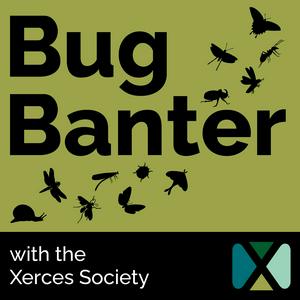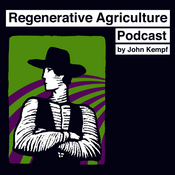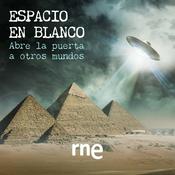58 episódios

Bring Back the Pollinators: Four Simple Steps to Save the Bees
06/1/2026 | 38min
For years now, there’s been a growing buzz—pun intended—about how to save our pollinators. Bees, butterflies, and so many other important species are struggling, but the good news is that each of us can make a big difference right in our own backyards. From planting native flowers to rethinking our use of pesticides, simple choices can transform any outdoor space into a thriving pollinator haven. In this episode, we’re diving into what it really takes to bring back the pollinators—and how you can be part of the solution.Joining us are two guests that have become regulars on the podcast, Aaron Anderson and Bug Banter’s very own co-host Matthew Shepherd. Aaron is a Pesticide Program Specialist at Xerces. He works with the public and Xerces staff to reduce pesticide use in residential landscapes, including promoting alternative pest control measures and pollinator-friendly gardening practices. Matthew is Xerces Director of Outreach and Education. He has been with us for over 25 years, working in pollinator conservation in towns and cities. Much of his work focuses on guiding neighborhood-level efforts such as pollinator gardens and small habitat projects in parks, as well as supporting the Bring Back the Pollinators campaign and promoting initiatives such as Leave the Leaves.---Photo: Emily MayThank you for listening! For more information go to xerces.org/bugbanter.

Walls That Speak: Inspiring Conservation Through Art
16/12/2025 | 37min
When science and art meet they create a nexus where inspiration and education combine to create impactful outcomes. From illustrated ID guides to building-sized murals, art has been interwoven into science communications for thousands of years and its value has continued to persist. Xerces has harnessed the power of images and we are excited to explore this topic.In this episode, we are sitting down with Jane Kim and Thayer Walker, who founded Ink Dwell, an art studio that produces stunning murals and other works that celebrate the natural world. Jane is a visual artist and science illustrator. She received a Bachelor of Fine Arts in Printmaking from Rhode Island School of Design and then attended California State University Monterey Bay, where she earned a master’s certificate in science illustration. She has created large-scale public art across the country, including the Wall of Birds at the Cornell Lab of Ornithology in Ithaca, and produced works for the National Aquarium in Baltimore, the de Young Museum in San Francisco, and more. Thayer manages Ink Dwell’s operations and is an author and correspondent who has written about science, adventure, exploration, and the natural world for nearly two decades—and along the way had some adventures of his own. (I read something about 20 days on a desert island and escaping the jaws of a jaguar…) With Jane, he co-authored The Wall of Birds, a book about that monumental mural at the Cornell Lab of Ornithology.---Photo: Benjamin ZackThank you for listening! For more information go to xerces.org/bugbanter.

A Year in Invertebrate Conservation: Successes and the Road Ahead
02/12/2025 | 51min
Over the past year, we’ve explored a diversity of invertebrates, the threats they face, and the ways we can help support them. In this episode, we’ll take a closer look at invertebrate conservation—reflecting on this year’s successes and achievements, as well as the challenges that lie ahead. What victories can we celebrate, and which conservation efforts must continue? What obstacles do we, as invertebrate enthusiasts, still face? Most importantly, what actions can people take right now to make a lasting difference?Who better to talk about this topic than Xerces Society executive director, Scott Black. Scott has led the Xerces Society for a quarter century, during which time Xerces has grown and become internationally recognized for its work. Scott himself is a renowned conservationist whose work has led to protection and restoration of habitat on millions of acres of rangelands, forests, and farmland, as well as protection for many endangered species.---Photo: Sara Morris/CC BY-NC 2.0Thank you for listening! For more information go to xerces.org/bugbanter.

Hidden in Plain Sight: Pesticide Contamination in Butterfly Host Plants
18/11/2025 | 29min
The State of the Butterflies in the United States project demonstrated that butterfly populations across the US are dramatically declining — they fell by more than 20% between the year 2000 and 2020. There are multiple causes, but one of them is the loss of caterpillar host plants. Getting more host plants into our neighborhoods and parks is essential — but what happens if those plants are contaminated by pesticides and they are toxic to the caterpillars that need them?To talk more about this conundrum is Aaron Anderson. Aaron is no stranger to Bug Banter listeners. Aaron is a member of Xerces’ pesticide reduction team, where his work focuses on reducing pesticide use in residential landscapes, including promoting alternative pest-control measures and pollinator-friendly gardening practices. More pertinently, he recently was a coauthor on a study of pesticide contamination of butterfly host plants.---Photo Credit: Kevin BurlsThank you for listening! For more information go to xerces.org/bugbanter.

Adaptations at Altitude: The Biology of Mountain Snails
04/11/2025 | 27min
Given the name of our podcast, it is no surprise that we talk a lot about bugs, but in this episode, we are stretching our invertebrate muscles and looking at a group of invertebrates that we haven’t considered before—mountain snails! To help us learn more about these fascinating animals is Dr. Lusha Tronstad. Lusha is the Invertebrate Zoology Program Manager for the Wyoming Natural Diversity Database at the University of Wyoming. The WNDD program is responsible for developing and maintaining data on the distribution, natural history, conservation status, and habitat requirements of rare invertebrate species in the state. Lusha has a Ph.D. in Zoology and Physiology from University of Wyoming and is interested in food webs, invasive species, conservation, bioassessment and biogeochemistry, while working in aquatic ecosystems and with pollinators.---Photo: Lusha TronstadThank you for listening! For more information go to xerces.org/bugbanter.
Mais podcasts de Ciência
Podcasts em tendência em Ciência
Sobre Bug Banter with the Xerces Society
Ouve Bug Banter with the Xerces Society, Ciência Pop e muitos outros podcasts de todo o mundo com a aplicação radio.pt

Obtenha a aplicação gratuita radio.pt
- Guardar rádios e podcasts favoritos
- Transmissão via Wi-Fi ou Bluetooth
- Carplay & Android Audo compatìvel
- E ainda mais funções
Obtenha a aplicação gratuita radio.pt
- Guardar rádios e podcasts favoritos
- Transmissão via Wi-Fi ou Bluetooth
- Carplay & Android Audo compatìvel
- E ainda mais funções


Bug Banter with the Xerces Society
descarregue a aplicação,
ouça.


































